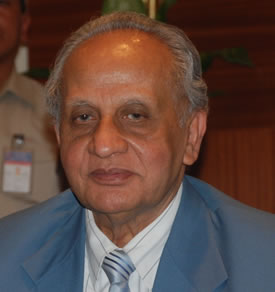Founding Chairman,
Amity Institute of Advanced Legal Studies, Amity University
Uttar Pradesh, India.
Dr. Tahir Mahmood, Member, Law Commission of India,[1][2] is a renowned jurist specializing in Islamic Law, Hindu Law, Religion and Law and Law Relating to Minorities. He has been Dean, Faculty of Law, University of Delhi, Chairman, National Commission for Minorities, Member, National Human Rights Commission and Jurist-Member, Ranganath Misra Commission. Dr. Mahmood is well-known in India and abroad for his expertise in religion and the law, human rights and civil liberties, especially the law relating to the educational rights of Minorities. He is a globally noted authority on Islamic Law, Legal Systems of the Arab World and Hindu Law, subjects on which he has written and edited more than two dozen books and 500 research papers. His academic work which focuses on his progressive interpretation
of these laws is widely acclaimed and has been cited by the Supreme Court of India and many State High Courts in more than 20 judgments besides being prescribed by many Indian and foreign Universities for higher legal studies. He has inaugurated, attended and presided over many international conferences and seminars all over the world and has delivered numerous lectures at internationally renowned Universities including the Universities of Harvard, Cambridge, London, Iowa and many others. As an expert on family laws, he has advised the International Commission of Jurists and many foreign governments. He is associated in different capacities with a number of notable Indian and foreign academic, legal and human rights organizations, prominent amongst them being the International Society on Family Law, Paris, the Vienna Christian-Islamic Round Table, the International Consortium of Religion and Law Studies, Milan, the Institute of Muslim Minority Affairs, Jeddah and the Committee for Drafting the Model Constitution for Islamic Countries, Kuala Lumpur. He is also the academic founder of many law schools in India including the Amity Institute of Advanced Legal Studies of which he is the Honorary Chairman.[3]
Professor Mahmood speaks Urdu, Hindi and English and has a fair knowledge of Arabic and Persian and is a strict vegetarian.
TAHIR MAHMOOD’S BOOKS
A. BOOKS Note :– Books no. 4, 6, 7, 8 & 11 have been cited by Supreme Court & various High Courts in 17 different judgments
(a) Books authored:
1. Changing Law of the Hindu Society (1968) 2. Family Law Reform in the Muslim World (1972) – [Malayalam translation 1982] 3. An Indian Civil Code and Islamic Law (1976) 4. Muslim Personal Law : Role of State in the Subcontinent (1977) – [2nd ed 1983] * 5. Family Planning : Muslim Viewpoint (1977) – reprinted 1981 6. Civil Marriage Law of India : Perspectives and Prospects (1978) * 7. The Muslim Law of India (1980) – [3rd edition 2002]* 8. Studies in Hindu Law (1981) – 3 volumes; [reprinted 1998]* 9. Personal Laws in Crisis – Endowment Lectures, Bombay University (1986) 10. Statutes of Personal Law in Islamic Countries : Texts & Analysis (1987) – [2nd edition 1995] 11. Statute Law relating to Muslims in India : Islamic & Constitutional Perspectives (1995)* 12. Uniform Civil Code : Fictions and Facts (1995) – [Malayalam translation 1999] 13. From the Heart : Select Speeches on Religion, Law and Literature (1998) 14. Minorities Commission : Minor Role in Major Affairs (2005) 15. Amid Gods and Lords : My Life with Votaries of Religion and Law (2005) 16. Laws of India on Religion and Religious Affairs (2008)
(b) Anthologies [books edited]:
17. Islamic Law in Modern India (1972) 18. Family Law and Social Change (1975) 19. Minorities and State at the Indian Law (1991) 20. Pressing Issues Facing the Nation (1992) 21. Human Rights in Islamic Law (1993) 22. Criminal Law in Islam and the Muslim World (1996) 23. Islamic Law in Indian Courts Since Independence: Fifty Years of Judicial Interpretation (1997) 24. Politics of Minority Educational Institutions : Law & Reality in Subcontinent (2007) 25. Vienna Interfaith Dialogue Yearbooks (2004–2007) – four volumes (i) Reading Signs of Time (iii) Intolerance and Violence (ii) Poverty and Injustice (iv) Education and Equality
(c) Muslim Law Classics Revised & Updated:
26. Syed Ameer Ali’s two-volume book on Muslim Law (1985) 27. Asaf Ali Asghar Fyzee’s casebook on Muslim Law (2005) 28. Asaf Ali Asghar Fyzee’s textbook on Muslim Law (2008) 29. DF Mulla’s book on Principles of Muslim Law (in progress)
(d) Original Books in Urdu:
30. Muslim Personal Law ke Tahaffuz ka Mas’ala (1972) 31. Hayat-e-Mahmood : Sawaneh-o-Nazariyat (1986) 32. Dil ki Hekayetein: Intikhab-e-Afkar (1998) 33. Jur’at-e-Rindana: Nazariyat-o-Shakhsiyat (2001) 34. Taza Hain Merey Waredat : Majmu’ah-e-Maqalat (2005) 35. Qissa-e-Dard Sunatey Hain : Afkar-o-Sawaneh (2009)
(e) Books translated:
36. Compendium of Islamic Laws- English translation of Muslim Law Board’s Urdu book (2001) 37. Muslim Qanoon ke Usool – Urdu translation of DF Mulla’s English book on Muslim law (2001) 38. Basic Reader of the Holy Qur’an – translation of late SM Hasan’s Urdu book on tajwid (2002) 39. Isharat-e-Waqt ka Shu’oor (Vienna Dialogue Yearbook) – translated from English to Urdu (2004) 40. Adam Rawadari aur Tashaddud (Vienna Dialogue Yearbook) – translated from English (2006)
(f) Journals (Founder-Editor):
1. Islamic and Comparative Law Quarterly – 44 issues (1981—1996) 2. Religion and Law Review – 12 issues (1992—1999) 3. Minorities India Quarterly – 12 issues (1996—1999) 4. Amity Law Watch – 12 issues (2003–2009

